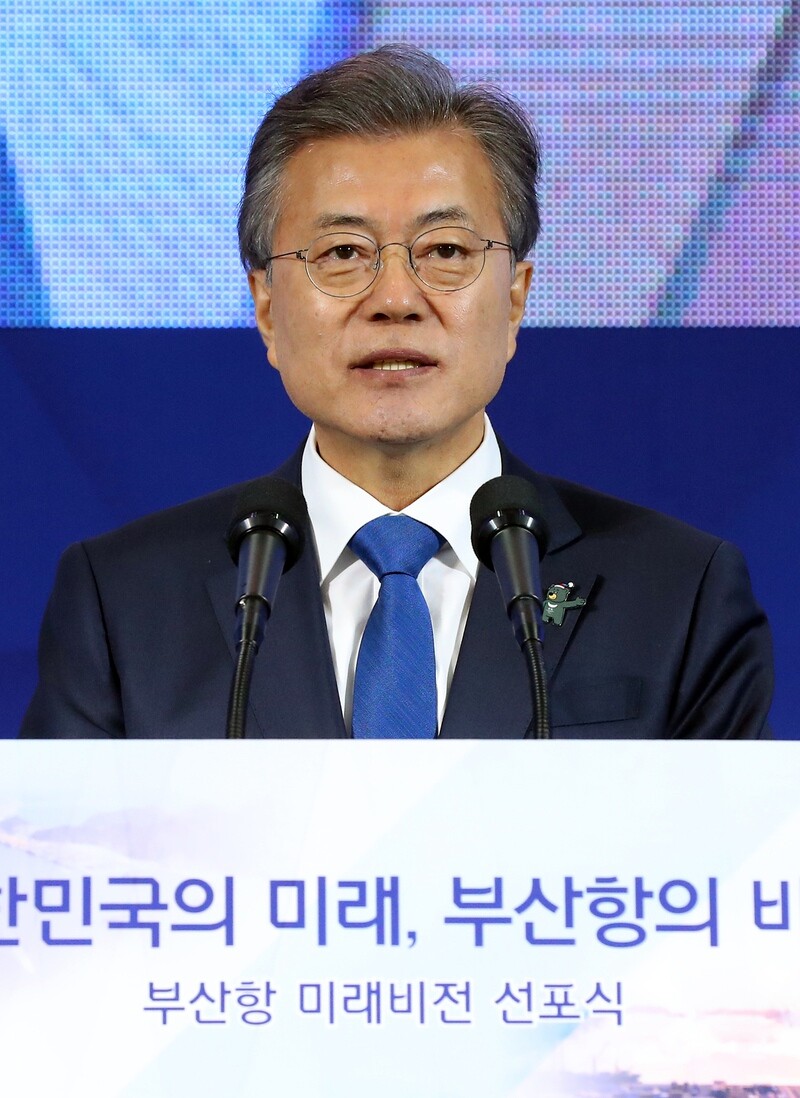hankyoreh
Links to other country sites 다른 나라 사이트 링크
[News Analysis] Three main agenda items announced for inter-Korean summit

The three main agenda items for the inter-Korean summit that were announced by Blue House Chief of Staff Im Jong-seok on Mar. 16 following the first meeting of the preparatory committee for the inter-Korean summit fit together like interlocking gears. The denuclearization of the Korean Peninsula, the establishment of a permanent peace and progress on inter-Korean relations must all be in sync for affairs on the Korean Peninsula to move forward.
The first agenda item mentioned on Mar. 16 by Lim, the committee chair, was the denuclearization of the Korean Peninsula. “The ultimate issue is denuclearization. The results of the special delegation’s visit to North Korea seems to indicate that the North wants to resolve this fundamental issue, too,” a senior official at the Blue House said. This suggests that there is no significant disagreement between South and North Korea about dealing with the issue of denuclearization, the fundamental issue on the Korean Peninsula, during the inter-Korean summit.
Denuclearization is both an internal issue on the Korean Peninsula between South and North Korea and an international issue largely between North Korea and the US. Not only is North Korea’s nuclear and missile capability much more advanced than it was during the first two inter-Korean summits in 2000 and 2007, but the upcoming inter-Korean summit will be followed by the first summit in history between the leaders of North Korea and the US, who will try to negotiate the issue of dismantling North Korea’s nuclear program. This makes it necessary for the leaders of South and North Korea to emphasize once again the principle of denuclearization during their summit while also having a candid and sincere conversation on the topic prior to the North Korea-US summit.

The reason Im chose “the establishment of permanent peace, including the groundbreaking relaxation of military tensions” as the second agenda item for the inter-Korean summit is because the only way to achieve genuine progress in denuclearization talks is to allay North Korea’s concerns about the stability of its regime. South Korean President Moon Jae-in already provided Kim Yong-chol, Vice Chairman of the Korean Workers' Party (KWP) Central Committee and Director of the United Front Department, with a detailed explanation of a path toward denuclearization when Kim visited the South to attend the closing ceremony of the Pyeongchang Winter Olympics.
When North Korean leader Kim Jong-un declared the principle of denuclearization during a meeting with Blue House National Security Advisor Chung Eui-yong and the rest of Moon’s special delegation to the North on Mar. 5, he added that the prerequisites for denuclearization were resolving the military threat against the North and providing a security guarantee for the regime.
“The previous plans for guaranteeing the security of the North Korean regime have involved North Korea and the US signing a peace treaty and normalizing relations. In this summit, we need to institutionalize peaceful coexistence by using inter-Korean relations to compensate for the security situation that troubles the North,” said Cho Sung-ryul, a senior research fellow at the Institute for National Security Strategy.
The third agenda item of “new and bold progress on inter-Korean relations” is also linked to the two previous items. If a mood for peace is formed through progress on denuclearization, the international community could lift its sanctions against North Korea, enabling real progress to be achieved on inter-Korean relations as well.
Economic cooperation depends on addressing the three fundamental issues“There has to be progress on the fundamental issues in order for there to be an expansion of economic cooperation or exchange,” said a senior official at the Blue House. The implication is that progress in inter-Korean relations will depend on how much progress is reached on the issues of denuclearization and establishing peace.
Since a communications hotline between the leaders of South and North Korea is being set up and a practical summit is being held at the Panmunjeom Joint Security Area, the initial signs are very positive. The fact that Seoul is referring to the meeting not as the “third inter-Korean summit” but as the “2018 inter-Korean summit” basically implies that the two leaders could meet again at any time.
“The discussion needs to be expanded to the issues of declaring an end to the Korean War – which is still temporarily on hold, according to international law – and of setting up a joint body to prepare a basic agreement to define the future of inter-Korean relations,” said Koo Kab-woo, professor at the University of North Korean Studies.
By Jung In-hwan and Kim Bo-hyeop, staff reporters
Please direct questions or comments to [english@hani.co.kr]

Editorial・opinion
![[Editorial] Penalties for airing allegations against Korea’s first lady endanger free press [Editorial] Penalties for airing allegations against Korea’s first lady endanger free press](https://flexible.img.hani.co.kr/flexible/normal/500/300/imgdb/original/2024/0502/1817146398095106.jpg) [Editorial] Penalties for airing allegations against Korea’s first lady endanger free press
[Editorial] Penalties for airing allegations against Korea’s first lady endanger free press![[Editorial] Yoon must halt procurement of SM-3 interceptor missiles [Editorial] Yoon must halt procurement of SM-3 interceptor missiles](https://flexible.img.hani.co.kr/flexible/normal/500/300/imgdb/child/2024/0501/17145495551605_1717145495195344.jpg) [Editorial] Yoon must halt procurement of SM-3 interceptor missiles
[Editorial] Yoon must halt procurement of SM-3 interceptor missiles- [Guest essay] Maybe Korea’s rapid population decline is an opportunity, not a crisis
- [Column] Can Yoon steer diplomacy with Russia, China back on track?
- [Column] Season 2 of special prosecutor probe may be coming to Korea soon
- [Column] Park Geun-hye déjà vu in Yoon Suk-yeol
- [Editorial] New weight of N. Korea’s nuclear threats makes dialogue all the more urgent
- [Guest essay] The real reason Korea’s new right wants to dub Rhee a founding father
- [Column] ‘Choson’: Is it time we start referring to N. Korea in its own terms?
- [Editorial] Japan’s rewriting of history with Korea has gone too far
Most viewed articles
- 160% of young Koreans see no need to have kids after marriage
- 2Months and months of overdue wages are pushing migrant workers in Korea into debt
- 3[Editorial] Penalties for airing allegations against Korea’s first lady endanger free press
- 4Historic court ruling recognizes Korean state culpability for massacre in Vietnam
- 5Presidential office warns of veto in response to opposition passing special counsel probe act
- 6[Guest essay] How Korea must answer for its crimes in Vietnam
- 7Story of massacre victim’s court victory could open minds of Vietnamese to Korea, says documentarian
- 8Historic verdict on Korean culpability for Vietnam War massacres now available in English, Vietnames
- 9Bills for Itaewon crush inquiry, special counsel probe into Marine’s death pass National Assembly
- 10In rejecting statute of limitations defense in massacre case, Korean court faces up to Vietnam War a